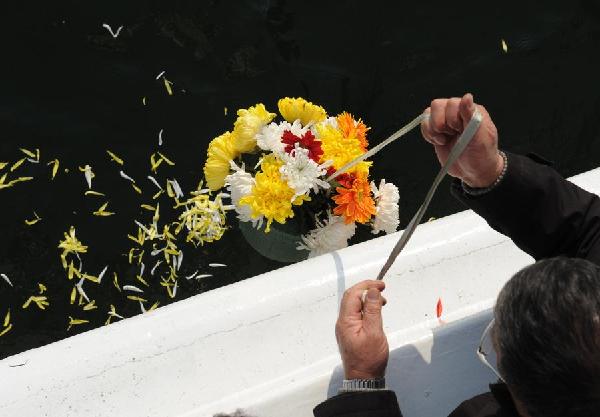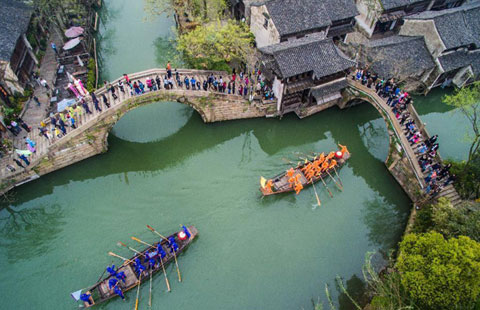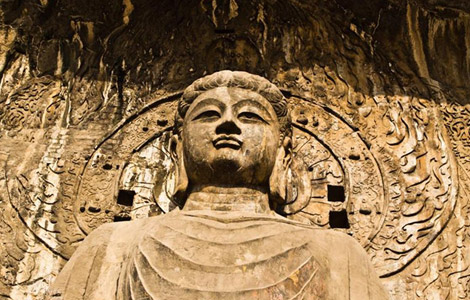China promotes eco-friendly burials
Updated: 2015-04-05 07:22
(Xinhua)
|
||||||||
 |
| A man joins a sea burial ceremony in Dalian, Northeast China's Liaoning province. [Photo/Xinhua] |
BEIJING - Along the shore near the north China coastal city of Tianjin, Zheng Meili joined her mother-in-law and over 300 others to commemorate their deceased relatives ahead of Qingming festival, also known as Tomb Sweeping Day.
However, they had no tombs to sweep. Instead, they scattered petals in the sea, where their loved ones rest in peace.
"My mother-in-law told me that she wants her remains to be scattered into the sea after her death, like her husband, so she can stay together with him there," Zheng said.
Chinese tradition holds that the dead should be buried in coffins beside their ancestors, but the custom has put a strain on the populous country's land resources.
A report released last week on China's funeral industry predicted that cemetery plots in most of China's provincial-level regions will be depleted in ten years.
According to statistics from the Ministry of Civil Affairs, a total of 9.73 million Chinese people died in 2013, which would require about 10 million square meters of land if they all chose traditional burial, the report said.
Waning cemetery space is pushing up prices for traditional funerals and is squeezing arable land, forests, grassland, and other environmental resources.
To deal with the problem, the government started promoting eco-friendly burials, such as sea burials, in the 1990s.
Others choose cremation with the option to scatter ashes on trees, lawns or flower gardens.
Over the past two decades, authorities in Beijing have registered 12,651 sea burials and the total number of eco-friendly burials reached 78,891 at the end of 2014.
To encourage more environmentally friendly funerals, local authorities in Beijing doubled subsidies for sea burials from 2,000 yuan ($326) to 4,000 yuan this year.
Under the subsidy, the government will cover travel expenses, insurance and meals for up to six relatives as well as a degradable urn for each burial at sea.
However, it is not easy to change people's minds on funeral customs, and many Chinese see a traditional burial as an obligation of filial piety toward their elders.
In 2014, only 3.5 percent of burials in 15 of Beijing's government-administered cemeteries were conducted using eco-friendly or land-saving methods.
"We hope that the proportion will increase to 50 percent by 2020," said Wang Qi, a civil affairs official in charge of the funeral industry for the municipal government. "We should not leave the green mountains covered with white bones," Wang said.
Xiao Fang, a professor and Chinese folklore expert with Beijing Normal University, noted that eco-burials should be promoted due to land resource challenges, but called for more human solutions to balance ecological protection needs with China's traditions and the concerns of the bereaved.

 2015 New York International Automobile Show kicks off
2015 New York International Automobile Show kicks off
 Ancient 'Xiangshi' kicks off in Wuzhen
Ancient 'Xiangshi' kicks off in Wuzhen
 Golden moments at jewelry show
Golden moments at jewelry show
 Luoyang, the ancient capital of thirteen dynasties
Luoyang, the ancient capital of thirteen dynasties
 Across America over the week (from March 27 to April 2)
Across America over the week (from March 27 to April 2)
 Off the beaten path: China's top 'surf' breaks
Off the beaten path: China's top 'surf' breaks
 Where eagles still soar
Where eagles still soar
 Top 5 cooperation priorities in the Belt and Road Initiative
Top 5 cooperation priorities in the Belt and Road Initiative
Most Viewed
Editor's Picks

|

|

|

|

|

|
Today's Top News
China promotes eco-friendly burials
Xi plants roots of
green awareness
Li backs firms' global vision
China to standardize energy conservation by 2020
More Chinese, US pilots killed in anti-Japanese invasion war identified
China checkmates US on Asia bank
Policy helps China to urbanize
Curbing 'brushing' difficult: report
US Weekly

|

|






